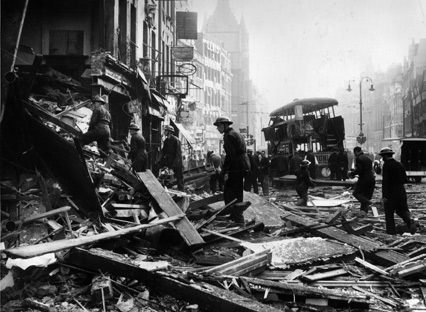A nation of looters: it even happened in the Blitz
Calls for the ‘Blitz Spirit’ following the riots are misguided: looting was rife in London's darkest hour

A free daily email with the biggest news stories of the day – and the best features from TheWeek.com
You are now subscribed
Your newsletter sign-up was successful
So David Cameron believes we live in a sick society where people loot at will and youngsters have no respect for authority. The gist of the Prime Minister's message on Wednesday seemed to be a lament for a more innocent era, a time when the Great British public would never have dreamt of looting shops and homes no matter how hard times might be. In other words, as more than one anguished commentator has said this week 'whatever happened to the Spirit of the Blitz?'
Yes, indeed, what ever did happen to that fabled Blitz Spirit that saw Britons – particularly Londoners – through the grim days of 1940 and 1941 when the German Luftwaffe raided the capital on 57 consecutive days and nights?
It's one of the great wartime myths that on the Home Front the British people stood as one. Many did, it's true, but just as we've seen a mindless display of opportunistic lawlessness from a few hundred men and women in recent days in London, Birmingham and Manchester, so a minority of Britons robbed and looted during the Blitz – and some of those involved were even younger than the 11-year-old who stood in Highbury Corner youth court on Wednesday accused of looting a Debenhams.
The Week
Escape your echo chamber. Get the facts behind the news, plus analysis from multiple perspectives.

Sign up for The Week's Free Newsletters
From our morning news briefing to a weekly Good News Newsletter, get the best of The Week delivered directly to your inbox.
From our morning news briefing to a weekly Good News Newsletter, get the best of The Week delivered directly to your inbox.
The Luftwaffe began its bombing of British cities on September 7 1940 and the raids continued with savage regularity until May 1941. London had it worst, but Coventry, Liverpool, Glasgow and Hull were also on the receiving end. It didn't take long for a hardcore of opportunists to realise there were rich pickings available in the immediate aftermath of a raid – and the looting wasn't limited to civilians.
In October 1940 Winston Churchill ordered the arrest and conviction of six London firemen caught looting from a burned-out shop to be hushed up by Herbert Morrison, his Home Secretary. The Prime Minister feared that if the story was made public it would further dishearten Londoners struggling to cope with the daily bombardments.
In November 1940 the Germans laid waste to Coventry - and looting there was as prevalent as in London. A 28-year-old man called Chrich was sentenced to three months' hard labour for stealing an 18th-century register from the city's cathedral, while three firemen were given six months for pilfering from a shop.
The looting was often carried out by gangs of children organised by a Fagin figure; he would send them into bombed-out houses the morning after a raid with orders to target coins from gas meters and display cases containing First World War medals. In April 1941 Lambeth juvenile court dealt with 42 children in one day, from teenage girls caught stripping clothes from dead bodies to a seven-year-old boy who had stolen five shillings from the gas meter of a damaged house. In total, juvenile crime accounted for 48 per cent of all arrests in the nine months between September 1940 and May 1941 and there were 4,584 cases of looting.
A free daily email with the biggest news stories of the day – and the best features from TheWeek.com
Joan Veazey, whose husband was a vicar in Kennington, south London, wrote in her diary after one raid in 1940: "The most sickening thing was to see people like vultures, picking up things and taking them away. I didn't like to feel that English people would do this, but they did."
Perhaps the most shameful episode of the whole Blitz occurred on the evening of March 8 1941 when the Cafe de Paris in Piccadilly was hit by a German bomb. The cafe was one of the most glamorous night spots in London, the venue for off-duty officers to bring their wives and girlfriends, and within minutes of its destruction the looters moved in.
"Some of the looters in the Cafe de Paris cut off the people's fingers to get the rings," recalled Ballard Berkeley, a policeman during the Blitz who later found fame as the 'Major' in Fawlty Towers. Even the wounded in the Cafe de Paris were robbed of their jewellery amid the confusion and carnage.
Then, as now, the newspapers demanded strong action from the government to curb the looting, though not even the most right-wing papers of 2011 went as far as the Daily Mirror did in November 1940.
"Fines and imprisonment have done nothing to stop the ghouls who rob even bodies lying in the ruins of little homes. Looting is in fact on the increase," thundered its editorial. "The country demands that this crime be stamped out... hang a looter and stop this filthy crime."
The Mirror never got its wish and prison remained the preferred punishment. So who knows, perhaps some of those men and women filing through English courts this week are just headed in the same direction as their grandparents 70 years ago.
Gavin Mortimer is the author of 'The Blitz', Osprey Publishing, 2010
-
 Local elections 2026: where are they and who is expected to win?
Local elections 2026: where are they and who is expected to win?The Explainer Labour is braced for heavy losses and U-turn on postponing some council elections hasn’t helped the party’s prospects
-
 6 of the world’s most accessible destinations
6 of the world’s most accessible destinationsThe Week Recommends Experience all of Berlin, Singapore and Sydney
-
 How the FCC’s ‘equal time’ rule works
How the FCC’s ‘equal time’ rule worksIn the Spotlight The law is at the heart of the Colbert-CBS conflict
-
 Local elections 2026: where are they and who is expected to win?
Local elections 2026: where are they and who is expected to win?The Explainer Labour is braced for heavy losses and U-turn on postponing some council elections hasn’t helped the party’s prospects
-
 How corrupt is the UK?
How corrupt is the UK?The Explainer Decline in standards ‘risks becoming a defining feature of our political culture’ as Britain falls to lowest ever score on global index
-
 The high street: Britain’s next political battleground?
The high street: Britain’s next political battleground?In the Spotlight Mass closure of shops and influx of organised crime are fuelling voter anger, and offer an opening for Reform UK
-
 Is a Reform-Tory pact becoming more likely?
Is a Reform-Tory pact becoming more likely?Today’s Big Question Nigel Farage’s party is ahead in the polls but still falls well short of a Commons majority, while Conservatives are still losing MPs to Reform
-
 ‘The money to fix this problem already exists’
‘The money to fix this problem already exists’Instant Opinion Opinion, comment and editorials of the day
-
 Taking the low road: why the SNP is still standing strong
Taking the low road: why the SNP is still standing strongTalking Point Party is on track for a fifth consecutive victory in May’s Holyrood election, despite controversies and plummeting support
-
 What difference will the 'historic' UK-Germany treaty make?
What difference will the 'historic' UK-Germany treaty make?Today's Big Question Europe's two biggest economies sign first treaty since WWII, underscoring 'triangle alliance' with France amid growing Russian threat and US distance
-
 Is the G7 still relevant?
Is the G7 still relevant?Talking Point Donald Trump's early departure cast a shadow over this week's meeting of the world's major democracies